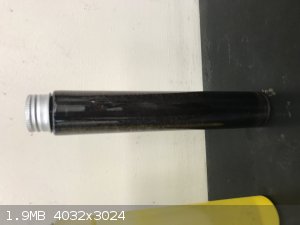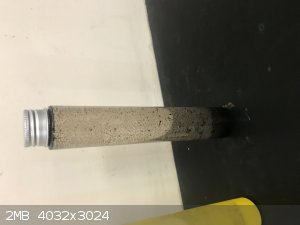beeludwig
Harmless

Posts: 30
Registered: 7-5-2019
Member Is Offline
|
|
Probable zinc sulfate colloid
So I’m still testing the compound but my guess is that this is a colloid of zinc sulfate.
The reason I’m not certain is that I was trying to make some zinc hydroxide out of zinc chloride and accidentally grabbed the sulfuric acid. So...
that was unpleasant. But at the end I had this. Zinc sulfate should be a white precipitate not black gunk. I asked around and the only answer was that
it was a colloid. I let it settle over night and that’s the second picture. I’ll evaporate off the liquid later and see if I can’t get the
typical zinc sulfate appearance.
 
|
|
|
fusso
International Hazard
    
Posts: 1922
Registered: 23-6-2017
Location: 4 ∥ universes ahead of you
Member Is Offline
|
|
Isnt ZnSO4 soluble?
|
|
|
beeludwig
Harmless

Posts: 30
Registered: 7-5-2019
Member Is Offline
|
|
It should be. absolutely. I’ve never seen anything like it before. And I have no other ideas for what it could be. I took a sample and evaporated
off the water and it turned into a nice fluffy powder that dissolves nicely in water. I am seriously open to any suggestiond for what else it might
be.
|
|
|
AJKOER
Radically Dubious
    
Posts: 3026
Registered: 7-5-2011
Member Is Offline
Mood: No Mood
|
|
A wild guess is impure ZnS which can be black (see https://en.wikipedia.org/wiki/Zinc_sulfide ).
As to how this was created, you have lots of H+ (from the H2SO4), light exposure or electrostatic charge particle suspensions or unreacted Zn metal...
resulting in the release of electrons. See this https://hemantmore.org.in/science/chemistry/coagulation/1305... and the remark on the role of an acid in charging colloidal particles in a good
electrolyte (the latter being the case with ZnCl2).
Then, in the presence of H+:
H+ + e- = .H
Expect also some hydrogen gas formation:
.H + .H --> H2 (gas)
Speculatively, repeated action of .H on SO4- may eventually be the source of the proposed sulfide anion.
Now, nitrobenzene is a good scavenger of solvated electrons (see https://en.wikipedia.org/wiki/Solvated_electron ), so if adding a little C6H5NO2 foils the reaction, perhaps getting closer to knowing.
[Edited on 17-6-2019 by AJKOER]
|
|
|